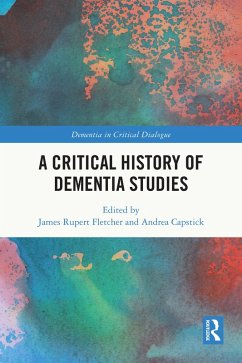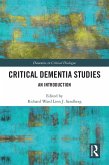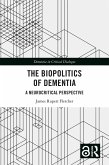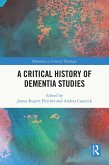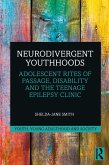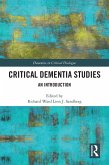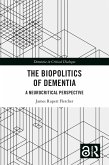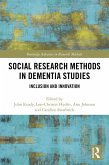A Critical History of Dementia Studies (eBook, ePUB)
Redaktion: Fletcher, James Rupert; Capstick, Andrea
41,95 €
41,95 €
inkl. MwSt.
Sofort per Download lieferbar

21 °P sammeln
41,95 €
Als Download kaufen

41,95 €
inkl. MwSt.
Sofort per Download lieferbar

21 °P sammeln
Jetzt verschenken
Alle Infos zum eBook verschenken
41,95 €
inkl. MwSt.
Sofort per Download lieferbar
Alle Infos zum eBook verschenken

21 °P sammeln
A Critical History of Dementia Studies (eBook, ePUB)
Redaktion: Fletcher, James Rupert; Capstick, Andrea
- Format: ePub
- Merkliste
- Auf die Merkliste
- Bewerten Bewerten
- Teilen
- Produkt teilen
- Produkterinnerung
- Produkterinnerung

Bitte loggen Sie sich zunächst in Ihr Kundenkonto ein oder registrieren Sie sich bei
bücher.de, um das eBook-Abo tolino select nutzen zu können.
Hier können Sie sich einloggen
Hier können Sie sich einloggen
Sie sind bereits eingeloggt. Klicken Sie auf 2. tolino select Abo, um fortzufahren.

Bitte loggen Sie sich zunächst in Ihr Kundenkonto ein oder registrieren Sie sich bei bücher.de, um das eBook-Abo tolino select nutzen zu können.
This book offers the first ever critical history of dementia studies.
- Geräte: eReader
- mit Kopierschutz
- eBook Hilfe
Andere Kunden interessierten sich auch für
![Critical Dementia Studies (eBook, ePUB) Critical Dementia Studies (eBook, ePUB)]() Critical Dementia Studies (eBook, ePUB)0,00 €
Critical Dementia Studies (eBook, ePUB)0,00 €![The Biopolitics of Dementia (eBook, ePUB) The Biopolitics of Dementia (eBook, ePUB)]() James Rupert FletcherThe Biopolitics of Dementia (eBook, ePUB)0,00 €
James Rupert FletcherThe Biopolitics of Dementia (eBook, ePUB)0,00 €![A Critical History of Dementia Studies (eBook, PDF) A Critical History of Dementia Studies (eBook, PDF)]() A Critical History of Dementia Studies (eBook, PDF)41,95 €
A Critical History of Dementia Studies (eBook, PDF)41,95 €![Neurodivergent Youthhoods (eBook, ePUB) Neurodivergent Youthhoods (eBook, ePUB)]() Shelda-Jane SmithNeurodivergent Youthhoods (eBook, ePUB)40,95 €
Shelda-Jane SmithNeurodivergent Youthhoods (eBook, ePUB)40,95 €![Critical Dementia Studies (eBook, PDF) Critical Dementia Studies (eBook, PDF)]() Critical Dementia Studies (eBook, PDF)0,00 €
Critical Dementia Studies (eBook, PDF)0,00 €![The Biopolitics of Dementia (eBook, PDF) The Biopolitics of Dementia (eBook, PDF)]() James Rupert FletcherThe Biopolitics of Dementia (eBook, PDF)0,00 €
James Rupert FletcherThe Biopolitics of Dementia (eBook, PDF)0,00 €![Social Research Methods in Dementia Studies (eBook, ePUB) Social Research Methods in Dementia Studies (eBook, ePUB)]() Social Research Methods in Dementia Studies (eBook, ePUB)43,95 €
Social Research Methods in Dementia Studies (eBook, ePUB)43,95 €-
-
-
This book offers the first ever critical history of dementia studies.
Dieser Download kann aus rechtlichen Gründen nur mit Rechnungsadresse in A, B, BG, CY, CZ, D, DK, EW, E, FIN, F, GR, HR, H, IRL, I, LT, L, LR, M, NL, PL, P, R, S, SLO, SK ausgeliefert werden.
Produktdetails
- Produktdetails
- Verlag: Taylor & Francis eBooks
- Seitenzahl: 214
- Erscheinungstermin: 26. September 2023
- Englisch
- ISBN-13: 9781000937633
- Artikelnr.: 68546547
- Verlag: Taylor & Francis eBooks
- Seitenzahl: 214
- Erscheinungstermin: 26. September 2023
- Englisch
- ISBN-13: 9781000937633
- Artikelnr.: 68546547
- Herstellerkennzeichnung Die Herstellerinformationen sind derzeit nicht verfügbar.
James Rupert Fletcher is a Wellcome fellow in the Department of Sociology at the University of Manchester, UK. His research covers several areas of the dementia economy, with an emphasis on using social theory and methods to understand dementia as a political entity. He has published on subjects including informal dementia care networks, mental capacity legislation and its influence on research governance, the anti-ageing technoscience market, anti-stigma and awareness raising campaigns regarding psychiatric disorder, the operationalisation of ethnicity and age in research, the biomarker discovery economy, the curation of dementia-friendly cultural events, dementia prevention public health strategies and environmental effects on cognition in urban settings. His lecturing spans medical sociology, the sociology of ageing, social research methods and ethical governance. Andrea Capstick is an associate professor at the University of Bradford School of Dementia Studies. She originally worked alongside the late Professor Tom Kitwood to develop the first distance learning programme in dementia studies. Since then, she has at different times led both the BSc (Hons) and the MSc programmes in dementia studies at the University of Bradford. She holds a Doctorate in Education (EdD) for her work on the use of film and narrative biography in teaching dementia studies, and has published on a variety of subjects including participatory visual methods, arts-based approaches to teaching and learning, the representation of people with dementia in the popular media and dementia as a human rights issue. She has undertaken research funded by the NIHR (2012-15) on the impact of participatory filmmaking on social inclusion and well-being for people with dementia in long-term care, and more recently on the study 'What works in dementia education and training?' (2015-18) where she led the Patient and Public Involvement (PPI) work.
Introduction
Part I: Paradigms
1. Pathologisation, (bio)medicalisation & biopolitics
2. The century without a war: Kitwood's concept of malignant social psychology and the need for historicisation in dementia studies
Part II: Discourses
3. Language about people with dementia
4. A Semiotic analysis of meanings of dementia around the world
5. Literary dementia studies: from managing estrangement to imaginatively reconceptualizing forgetfulness
Part III: Intersectionalities
6. Gender awareness and feminist approaches in dementia studies
7. "On my good days, I can [...] almost pass for a normal person": reading the film Still Alice using the conceptual lens of heteronormativity
8. Race, ethnicity and culture: problematic application in dementia and old age
Part IV: Methodologies
9. 'Whose story is it and what is it for?': Life story as critical discourse in dementia studies
10. From symptoms to citizenship: A critical reading of the perceived value of arts and culture in a dementia context
Part V: Politics
11. Human rights & dementia: a 'socratic dialogue'
12. Experts by experience: "I don't want to be shaken, I want to be a shaker"
Conclusion: multi-disciplinary, multi-historied, multi-critical
Part I: Paradigms
1. Pathologisation, (bio)medicalisation & biopolitics
2. The century without a war: Kitwood's concept of malignant social psychology and the need for historicisation in dementia studies
Part II: Discourses
3. Language about people with dementia
4. A Semiotic analysis of meanings of dementia around the world
5. Literary dementia studies: from managing estrangement to imaginatively reconceptualizing forgetfulness
Part III: Intersectionalities
6. Gender awareness and feminist approaches in dementia studies
7. "On my good days, I can [...] almost pass for a normal person": reading the film Still Alice using the conceptual lens of heteronormativity
8. Race, ethnicity and culture: problematic application in dementia and old age
Part IV: Methodologies
9. 'Whose story is it and what is it for?': Life story as critical discourse in dementia studies
10. From symptoms to citizenship: A critical reading of the perceived value of arts and culture in a dementia context
Part V: Politics
11. Human rights & dementia: a 'socratic dialogue'
12. Experts by experience: "I don't want to be shaken, I want to be a shaker"
Conclusion: multi-disciplinary, multi-historied, multi-critical
Introduction
Part I: Paradigms
1. Pathologisation, (bio)medicalisation & biopolitics
2. The century without a war: Kitwood's concept of malignant social psychology and the need for historicisation in dementia studies
Part II: Discourses
3. Language about people with dementia
4. A Semiotic analysis of meanings of dementia around the world
5. Literary dementia studies: from managing estrangement to imaginatively reconceptualizing forgetfulness
Part III: Intersectionalities
6. Gender awareness and feminist approaches in dementia studies
7. "On my good days, I can [...] almost pass for a normal person": reading the film Still Alice using the conceptual lens of heteronormativity
8. Race, ethnicity and culture: problematic application in dementia and old age
Part IV: Methodologies
9. 'Whose story is it and what is it for?': Life story as critical discourse in dementia studies
10. From symptoms to citizenship: A critical reading of the perceived value of arts and culture in a dementia context
Part V: Politics
11. Human rights & dementia: a 'socratic dialogue'
12. Experts by experience: "I don't want to be shaken, I want to be a shaker"
Conclusion: multi-disciplinary, multi-historied, multi-critical
Part I: Paradigms
1. Pathologisation, (bio)medicalisation & biopolitics
2. The century without a war: Kitwood's concept of malignant social psychology and the need for historicisation in dementia studies
Part II: Discourses
3. Language about people with dementia
4. A Semiotic analysis of meanings of dementia around the world
5. Literary dementia studies: from managing estrangement to imaginatively reconceptualizing forgetfulness
Part III: Intersectionalities
6. Gender awareness and feminist approaches in dementia studies
7. "On my good days, I can [...] almost pass for a normal person": reading the film Still Alice using the conceptual lens of heteronormativity
8. Race, ethnicity and culture: problematic application in dementia and old age
Part IV: Methodologies
9. 'Whose story is it and what is it for?': Life story as critical discourse in dementia studies
10. From symptoms to citizenship: A critical reading of the perceived value of arts and culture in a dementia context
Part V: Politics
11. Human rights & dementia: a 'socratic dialogue'
12. Experts by experience: "I don't want to be shaken, I want to be a shaker"
Conclusion: multi-disciplinary, multi-historied, multi-critical
